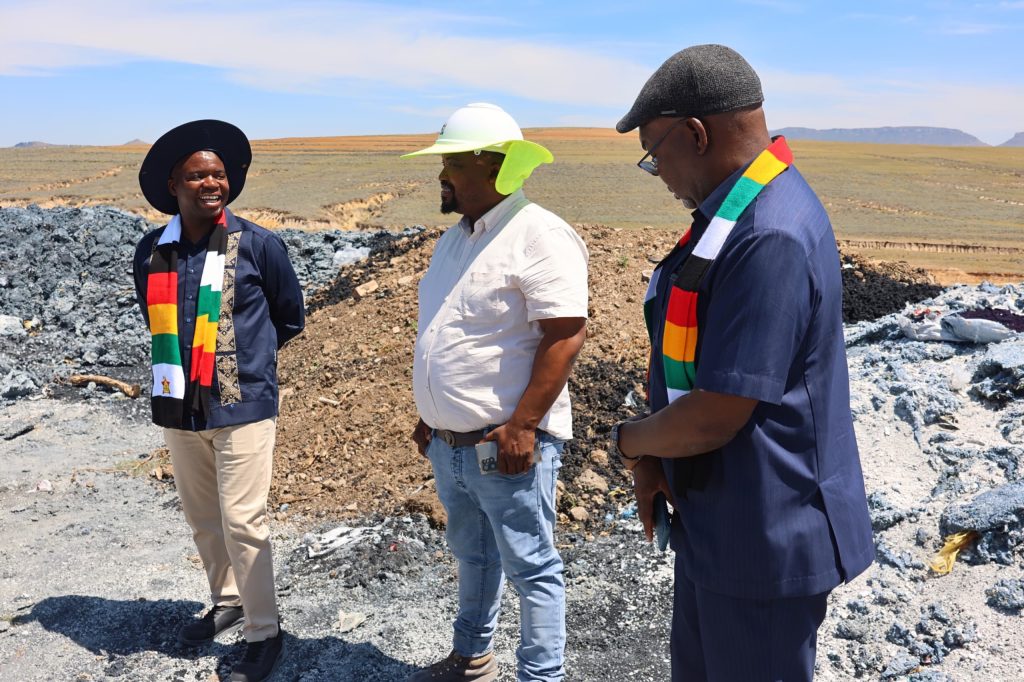By Staff Reporter
Masero, Lesotho – The government of Lesotho has engaged Geo Pomona Waste Management (Pvt) Ltd in a landmark initiative to establish an environmentally sustainable waste management system.
This partnership marks a pivotal step toward addressing Lesotho’s long standing waste management challenges.
Until now, the country has been exporting hazardous waste 500 kilometers to South Africa due to the absence of a functional landfill capable of recycling or safely disposing of waste.
In the capital city, Maseru, uncollected waste has been a persistent issue, with residents enduring the stench and health risks posed by the aging Tsosane dumpsite, which has been in operation since the 1980s.
Yesterday, officials from the Zimbabwean government, Geo Pomona Waste Management, Maseru City Council, and local community leaders toured the toxic Tsosane dumpsite and the proposed landfill site at Tsoeneng to assess the gravity of the situation.
This visit follows the recent Southern African Development Community (SADC) Heads of State summit, during which Geo Pomona Waste Management’s achievements were showcased, coinciding with President Mnangagwa’s assumption of the regional bloc’s chairmanship.
Deputy Chief Secretary in the Office of the President and Cabinet, Engineer Amos Marawa, highlighted the urgency of the waste crisis.
“We have been invited to come and see the challenges they are facing, very similar to what we were facing in Zimbabwe, but here I think it’s more urgent…,” he said.
“The housing is actually adjacent to the dumpsite, which has overfilled the area, outlived its lifespan.We appreciate that the government has already identified this as one of its priorities,” he said.
Engineer Marawa said since Maseru City Council has already identified a new landfill site, Zimbabwe through Geo Pomona Waste Management is eager to partner in ensuring that from the onset, the system for waste management is actually properly designed.
He said looking at the managed engineered landfills, as well as the method of collection, to ensure that this can be more sustainable.
“More importantly, how to rehabilitate and encapsulate this particular site for the safety of the community that is being affected by this site. So we believe the tour is going well, we have been well received, and the important thing is that the government appreciates the challenges they are facing.
“We hope that with the same urgency, then there can be solutions and funding to ensure that we put in place a more sustainable waste management system,” he said.
Geo Pomona Waste Management executive chairman and chief executive officer Dr Dilesh Nguwaya said the situation is a replica of the former Pomona dumpsite in Harare.
“The residents who are close to this dumpsite are facing similar problems like before in Pomona, but when we took over from the City of Harare we had to come up with a good solution to make sure we transform the dumpsite to become a waste management facility,” he said.
“As we are seeing right now, there’s no space to transform this dumpsite. It is already full, and the government needs to come up with an urgent solution in order for these people to live in a good environment.”
Maseru City Council town clerk and chief executive officer Moea Makhakhe said their current dumpsite was initially a quarry site, and it just, like all other dumpsites, just grew out of the one person starting to dump.
“We have been stuck with it. It’s full of debris, and it poses significant dangers to the community. This is why we went across the river in Limpopo to invite Geo Pomona here to exchange notes with us and to see what strategic partnerships we can have with them to try and get this out of this problem in the short, medium, and long term,” he said.
Maseru City Council director of Health and Environment Motseki Khuti said they suffered huge losses exporting harzadous waste to South Africa.
“We actually had to acquire land here because we used to export this hazardous waste to South Africa some 500 kilometres away,” he said.
Director of Health Khuti said they had to come up with a plan of designing a temporary containment centre with the challenge now being lack of enough funds to build another one.
“So if we had more funds, we would have constructed more. It is already overspilling, you can notice that. The challenge is we are already contaminating groundwater.
“We also have challenges with the community for healthy purposes, because we think this might contaminate their groundwater. Since we don’t have enough funds, we are even unable to test the water, as we used to do initially,” he said.
Director Khuti said Maseru City was also operating without anti-litter by-laws, something they also want to tap from Zimbabwe.
Maseru ward 3 councillor Teboho Mohoko weighed in saying their government must quickly intervene as they are stark between a rock and a hard surface.
“Our lives are miserable here. Imagine enduring the smell daily, the eyesore sight of the dump. An urgent solution is needed,” he said.
Maseru City Council ward 10 councillor Paul Phalatsi said an urgent solution was needed as the situation was a ticking time bomb.
“If we can maintain the dumpsite or improve it to be something better, it could benefit the community. I think the community doesn’t have that much of a problem if there are no consequences that are health risks or economically bringing them down.
“Because this dumpsite has become a health risk in the sense that you can imagine just sports people breathing around this place. Just runners or footballers who live around close to this place who are breathing this air during time of exercise,” he said.




